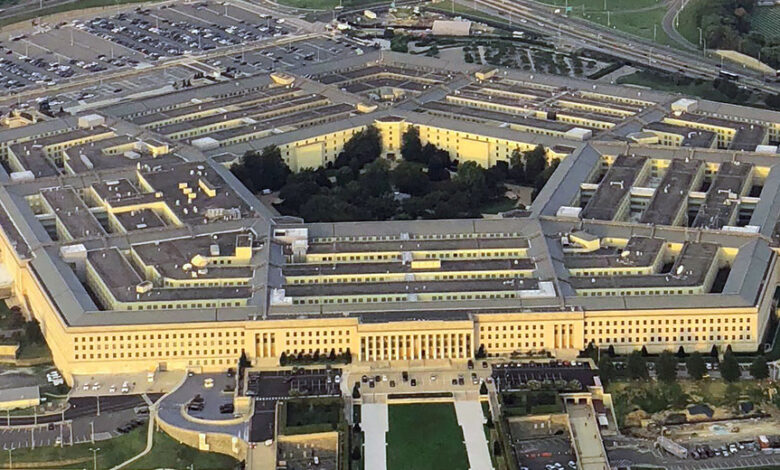Pentagon Supply Chain Fails Minimal Standards for US National Security

Most contractors the Department of Defense hired in the last five years failed to meet the required minimum cybersecurity standards, posing a significant risk to U.S. national security.
Managed service vendor CyberSheath on Nov. 30 released a report showing that 87% of the Pentagon supply chain fails to meet basic cybersecurity minimums. Those security gaps are subjecting sizeable prime defense contractors and their subcontractors to cyberattacks from a range of threat actors putting U.S. national security at risk.
Those risks have been well-known for some time without attempts to fix them. This independent study of the Defense Industrial Base (DIB) is the first to show that federal contractors are not properly securing military secrets, according to CyberSheath.
The DIB is a complex supply chain comprised of 300,000 primes and subcontractors. The government allows these approved companies to share sensitive files and communicate securely to get their work done.
Defense contractors will soon be required to meet Cybersecurity Maturity Model Certification (CMMC) compliance to keep those secrets safe. Meanwhile, the report warns that nation-state hackers are actively and specifically targeting these contractors with sophisticated cyberattack campaigns.
“Awarding contracts to federal contractors without first validating their cybersecurity controls has been a complete failure,” Eric Noonan, CEO at CyberSheath, told TechNewsWorld.
Defense contractors have been mandated to meet cybersecurity compliance requirements for more than five years. Those conditions are embedded in more than one million contracts, he added.
Dangerous Details
The Merrill Research Report 2022, commissioned by CyberSheath, revealed that 87% of federal contractors have a sub-70 Supplier Performance Risk System (SPRS) score. The metric shows how well a contractor meets Defense Federal Acquisition Regulation Supplement (DFARS) requirements.
DFARS has been law since 2017 and requires a score of 110 for full compliance. Critics of the system have anecdotally deemed 70 to be “good enough.” Even so, the overwhelming majority of contractors still come up short.
“The report’s findings show a clear and present danger to our national security,” said Eric Noonan. “We often hear about the dangers of supply chains that are susceptible to cyberattacks.”
The DIB is the Pentagon’s supply chain, and we see how woefully unprepared contractors are despite being in threat actors’ crosshairs, he continued.
“Our military secrets are not safe, and there is an urgent need to improve the state of cybersecurity for this group, which often does not meet even the most basic cybersecurity requirements,” warned Noonan.
More Report Findings
The survey data came from 300 U.S.-based DoD contractors, with accuracy tested at the 95% confidence level. The study was completed in July and August 2022, with CMMC 2.0 on the horizon.
Roughly 80% of the DIB users failed to monitor their computer systems around-the-clock and lacked U.S.-based security monitoring services. Other deficiencies were evident in the following categories that will be required to achieve CMMC compliance:
- 80% lack a vulnerability management solution
- 79% lack a comprehensive multi-factor authentication (MFA) system
- 73% lack an endpoint detection and response (EDR) solution
- 70% have not deployed security information and event management (SIEM)
These security controls are legally required of the DIB, and since they are not met, there is a significant risk facing the DoD and its ability to conduct armed defense. In addition to being largely non-compliant, 82% of contractors find it “moderately to extremely difficult to understand the governmental regulations on cybersecurity.
Confusion Rampant Among Contractors
Some defense contractors across the DIB have focused on cybersecurity only to be stalled by obstacles, according to the report.
When asked to rate DFARS reporting challenges on a scale from one-to-10 (with 10 being extremely challenging), about 60% of all respondents rated “understanding requirements” a seven in 10 or higher. Also high on the list of challenges were routine documentation and reporting.
The primary obstacles contractors listed are challenges in understanding the necessary steps to achieve compliance, the difficulty with implementing sustainable CMMC policies and procedures, and the overall cost involved.
Unfortunately, those results closely paralleled what CyberSheath expected, admitted Noonan. He noted that the research confirmed that even fundamental cybersecurity measures like multi-factor authentication had been largely ignored.
“This research, combined with the False Claims Act case against defense giant Aerojet Rocketdyne, shows that both large and small defense contractors are not meeting contractual obligations for cybersecurity and that the DoD has systemic risk throughout their supply chain,” Noonan said.
No Big Surprise
Noonan believes the DoD has long known that the defense industry is not addressing cybersecurity. News reporting of seemingly never-ending nation-state breaches of defense contractors, including large-scale incidents like the SolarWinds and False Claims Act cases, proves that point.
“I also believe the DoD has run out of patience after giving contractors years to address the problem. Only now is the DoD going to make cybersecurity a pillar of contract acquisition,” said Noonan.
He noted the planned new DoD principle would be “No cybersecurity, no contract.”
Noonan admitted that some of the struggles that contractors voiced about difficulties in understanding and meeting cyber requirements have merit.
“It is a fair point because some of the messaging from the government has been inconsistent. In reality, though, the requirements have not changed since about 2017,” he offered.
What’s Next
Perhaps the DoD will pursue a get-tougher policy with contractors. If contractors complied with what the law required in 2017, the entire supply chain would be in a much better place today. Despite some communication challenges, the DoD has been incredibly consistent on what is required for defense contractor cybersecurity, Noonan added.
The current research now sits atop a mountain of evidence that proves federal contractors have a lot of work to do to improve cybersecurity. It is clear that work will not be done without enforcement from the federal government.
“Trust without verification failed, and now the DoD appears to be moving to enforce verification,” he said.
DoD Response
TechNewsWorld submitted written questions to the DoD about the supply chain criticism in the CyberSheath report. A spokesperson for CYBER/IT/DOD CIO for the Department of Defense replied, stating that it would take a few days to dig into the issues. We will update this story with any response we receive.
Update: Dec. 9, 2022 – 3:20 PM PT
DoD Spokesperson and U.S. Navy Commander Jessica McNulty provided this response to TechNewsWorld:
CyberSheath is a company that has been evaluated by the Cyber Accreditation Body (Cyber AB) and met the requirements to become a Registered Practitioner Organization, qualified to advise and assist Defense Industrial Base (DIB) companies with implementing CMMC. The Cyber AB is a 501(c)(3) that authorizes and accredits third-party companies conducting assessments of companies within the DIB, according to U.S. Navy Commander Jessica McNulty, a Department of Defense spokesperson.
McNulty confirmed that the DoD is aware of this report and its findings. The DoD has not taken any action to validate the findings, nor does the agency endorse this report, she said.
However, the report and its findings are generally not inconsistent with other prior reports (such as the DoD Inspector General’s Audit of Protection of DoD Controlled Unclassified Information on Contractor-Owned Networks and Systems (ref. DODIG-2019-105) or with results of compliance assessments performed by the DoD, as allowed/required by DFARS clause 252.204-7020 (when applicable), she noted.
“Upholding adequate cybersecurity standards, such as those defined by the National Institute of Standards and Technology (NIST) and levied as contractual requirements through application of DFARS 252.204-7012, is of the utmost importance for protecting DoD’s controlled unclassified information. DoD has long recognized that a mechanism is needed to assess the degree to which contract performers comply with these standards, rather than taking it on faith that the standards are met,” McNulty told TechNewsWorld.
For this reason, the DoD’s Cybersecurity Maturity Model Certification (CMMC) program was initiated, and the DoD is working to codify its requirements in part 32 of the Code of Federal Regulations, she added.
“Once implemented, CMMC assessment requirements will be levied as pre-award requirements, where appropriate, to ensure that DoD contracts are awarded to companies that do, in fact, comply with underlying cybersecurity requirements,” McNulty concluded.
Get Best News and Web Services here







